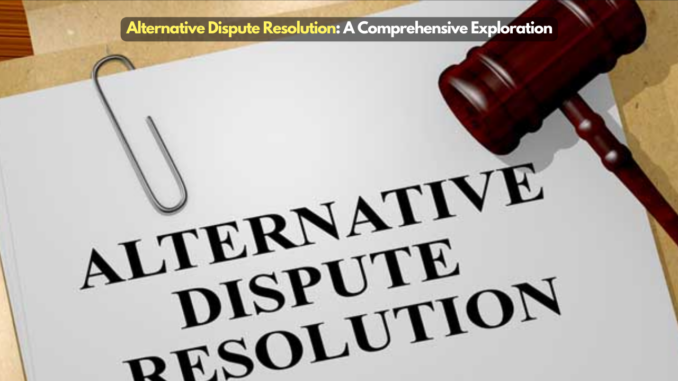
In a world marked by intricate relationships and diverse interests, conflicts are inevitable. Disputes can arise in various contexts, whether they involve business agreements, interpersonal relationships, property rights, or other areas of human interaction. To navigate these disputes and achieve resolution, societies have developed a range of approaches, one of which is Alternative Dispute Resolution (ADR). ADR encompasses a collection of methodologies that serve as alternatives to traditional litigation, offering parties involved in a dispute a chance to seek resolution through processes that are less formal, time-consuming, and adversarial. In this comprehensive exploration, we will delve into the various facets of Alternative Dispute Resolution, examining its types, benefits, challenges, and real-world applications.
Types of Alternative Dispute Resolution: ADR encompasses several distinct approaches, each tailored to different circumstances and preferences. Some of the most commonly used forms of ADR include negotiation, mediation, arbitration, and collaborative law.
- Negotiation: Negotiation is the most fundamental form of ADR, often serving as the initial step in resolving disputes. It involves direct communication between parties with conflicting interests, either on their own or with the assistance of legal representatives. Negotiation can occur informally or formally, and its success depends on the parties’ willingness to compromise and find mutually agreeable solutions.
- Mediation: Mediation is a structured process facilitated by a neutral third party—the mediator. The mediator assists the parties in communicating, identifying issues, and generating potential solutions. Unlike a judge, the mediator does not impose a decision; rather, they guide the parties toward an agreement that aligns with their interests. Mediation promotes open dialogue, cooperation, and creative problem-solving.
- Arbitration: Arbitration is a more formal ADR process where a neutral arbitrator or panel of arbitrators reviews evidence and arguments presented by the parties and makes a binding decision. Arbitration resembles a simplified courtroom proceeding but offers greater flexibility in terms of rules and procedures. It is often used in commercial contracts, where parties agree in advance to be bound by the arbitrator’s decision, known as an award.
- Collaborative Law: Collaborative law involves attorneys who commit to resolving a dispute without resorting to litigation. The process is client-centered, focusing on open communication, mutual respect, and creative problem-solving. Collaborative law can be especially effective in family law matters, where emotional considerations are paramount.
Benefits of Alternative Dispute Resolution: The appeal of ADR lies in its ability to offer parties involved in a dispute numerous advantages over traditional litigation. Some of the key benefits include:
- Cost-Efficiency: Litigation can be costly due to legal fees, court expenses, and the protracted nature of proceedings. ADR processes generally require fewer formalities and are often less expensive, making them an attractive option for parties seeking to manage their financial resources effectively.
- Time Savings: Court cases can stretch on for months or even years, causing undue stress and delay. ADR processes are typically quicker, allowing parties to reach resolution faster and move forward with their lives or business activities.
- Flexibility and Informality: ADR processes can be tailored to the parties’ specific needs and the nature of the dispute. This flexibility promotes a less adversarial environment, which can foster better communication and cooperation.
- Preservation of Relationships: Particularly in disputes involving ongoing relationships, such as business partnerships or family matters, ADR processes can help preserve relationships by reducing hostility and acrimony.
- Confidentiality: Many ADR proceedings, such as mediation and collaborative law, are confidential. This can be appealing to parties who wish to avoid public exposure of sensitive information.
- Empowerment: ADR processes empower parties to play an active role in shaping the outcome of their dispute, fostering a sense of ownership over the resolution.
Challenges and Considerations: While ADR offers numerous benefits, it is not without its challenges and considerations.
- Enforceability: In some cases, parties might be hesitant to engage in ADR if they doubt the enforceability of the outcome. While arbitration awards are generally enforceable, other ADR outcomes might require court approval to be binding.
- Power Imbalance: A power imbalance between parties could affect the fairness of certain ADR processes. For instance, in mediation or negotiation, a stronger party might exert undue pressure on the weaker party.
- Limited Discovery: Compared to litigation, ADR processes often involve limited discovery of evidence, which could potentially result in incomplete information being considered during the resolution.
- Uncooperative Parties: ADR relies on the willingness of parties to engage in good faith. If one party is uncooperative or unwilling to negotiate, the ADR process might fail.
Real-World Applications: Alternative Dispute Resolution has found applications in various domains, showcasing its adaptability and effectiveness:
- Commercial Disputes: Businesses often use arbitration to resolve disputes arising from contracts, transactions, or partnerships. The expedited nature of arbitration is particularly advantageous in the business world.
- Labor Relations: Labor disputes between employers and employees can be resolved through mediation or negotiation, allowing both parties to address their concerns and reach agreements on wages, working conditions, and more.
- Family Law: Mediation and collaborative law are frequently used in divorce and custody cases, enabling families to make decisions about property division, child custody, and spousal support without the acrimony of a courtroom battle.
- International Conflicts: Cross-border disputes benefit from arbitration, as it provides a neutral forum for parties from different jurisdictions to resolve conflicts without getting entangled in complex legal systems.
- Community Disputes: ADR processes, such as community mediation, have been employed to address conflicts within neighborhoods, schools, and local organizations, promoting harmony and understanding.
Conclusion: Alternative Dispute Resolution offers a valuable toolkit for parties seeking to resolve conflicts in a more efficient, flexible, and amicable manner than traditional litigation. While it presents its own set of challenges, its benefits in terms of cost savings, time efficiency, and relationship preservation cannot be understated. As societies continue to seek methods of addressing disputes without resorting to prolonged and adversarial court battles, ADR will likely remain a pivotal approach to fostering resolution, promoting communication, and maintaining social harmony.

Leave a Reply